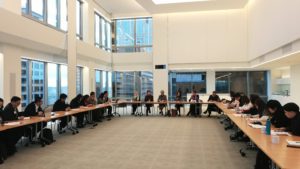
On January 2, 2019, the Washington State China Relations Council held a panel discussion on women in philanthropy in the U.S. and China. Three women experts and leaders in the field—Colleen Willoughby, Susan Heikkala, and Elaine Nonneman—shared their experiences and insights with a delegation of 23 leading philanthropists from China on motivations and effective practices in philanthropy. Emily Weaver, a WSCRC board member, who manages the Richards Rockefeller Fellowship at the Rockefeller Brother Fund, and Victor Kuo, founder of VK Global Advising, moderated the discussion.
Colleen Willoughby is co-founder and former president of the Washington Women’s Foundation. Colleen noted that over the last 20 years, a new space has emerged for women in philanthropy and presented opportunities that were not available in the past. She mainly discussed the collective giving model that was first created by the Washington Women’s Foundation. This form of community financing, where funds are generated from a collection of women members, makes large grants dedicated to community wellbeing possible. The model has been replicated by 65 groups across the U.S., representing a total of 120,000 women.
Susan Heikkala, a former board director of WSCRC, is co-founder and former deputy director of Global Women—Partners in Philanthropy, an organization dedicated to building women’s philanthropy in China. She is also an active member of the Washington Women’s Foundation. Following Colleen’s remarks, Susan added that another reason for women working collectively on these issues is to help nurture leadership, educate members on how to be more effective, and understand and meet the pressing needs within communities. Susan also shared best practices for ensuring the standard and effectiveness of grants, such as inviting local experts to talk about key issues for each grant year and reviewing proposals to evaluate those who are seeking funds at workshops.
Elaine Nonneman is the founder of Channel Foundation and a member for the Women’s Donors Network. Her philanthropy work and grant giving are focused on women’s human rights and social justice in the world. Citing her own experience, Elaine noted that it took her a long time to become conformable being a philanthropist until she joined the Social Justice Fund Northwest, whose purpose was not to solve the symptoms of the problems by simply giving out money, but to get at the root of these problems. Elaine emphasized that there is a place for smaller foundations like the Channel Foundation to meet the needs of organizations (e.g., start-ups and grassroot initiatives) that are too small to be supported by large grants. She explained the importance of a global network and working closely with local partners for fundraising. Being a member of the Women’s Donors Network enables her to understand how collaborative work can bring knowledge and experience to local organizations.
A lively and informative Q&A session followed the panelists’ remarks. After expressing their appreciation to the three experts’ contributions to philanthropy and their insights into women and philanthropy, the Chinese delegation expressed interests in issues related to grant-giving focus, collaboration standards, and how to evaluate a project and potential grantees. Colleen emphasized a foundation should be as “innovative as responsive,” and it is vital to have an experienced grant committee. Susan explained a collaborative way for project/fund evaluation—instead of telling what the grantees should do, her organization relies on the grantees to measure their own work and identify and overcome challenges; they meet with the grantees once a year for three years after giving a grant.
The panelists are very interested in the development of philanthropy in China, and women’s roles in the field. The delegation responded that the direction of China’s women philanthropy has changed from general grantmaking on women’s health and employment to more focused issues such as gender equity. Another representative from the delegation also noted that in big cities like Beijing, Shanghai, Guangzhou, and Shenzhen, there are more women philanthropists than their male counterparts.
At the conclusion of the event, both parties expressed the needs to continue this conversation in greater depth.
WSCRC extends special thanks to WSCRC board member Annamarie Larson of K&L Gates for generously providing the meeting venue and beverages.
Summary Author: Man Wang